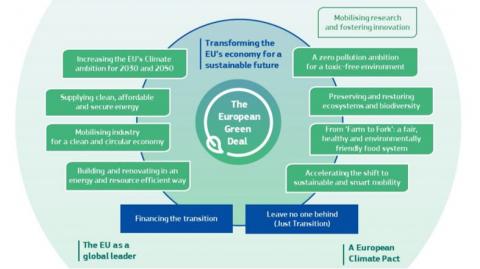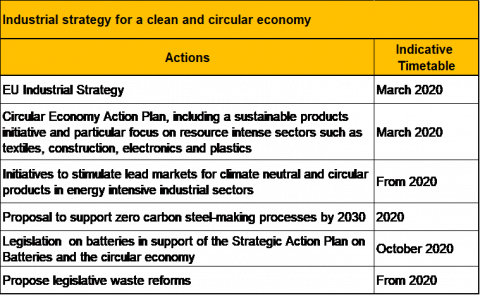The European Green Deal and COVID-19, implications for research and innovation

The European Green Deal, which is the European Union new growth strategy, aims to 'transform the EU into a fair and prosperous society, with a modern, resource-efficient and competitive economy where there are no net emissions of greenhouse gases in 2050 and where economic growth is decoupled from resource use.'
The European Green Deal complies with the United Nations 2030 Agenda and the Sustainable Development Goals (SDGs). It aims to put sustainability and the well-being of citizens at the centre of economic policy, and the SDGs at the heart of the EU’s policymaking and action. The European Green Deal includes a roadmap with a large number of elements and key actions: climate ambition; clean, affordable, and secure energy; industrial strategy for a clean and circular economy; sustainable and smart mobility; greening the Common Agricultural Policy / 'Farm to Fork' strategy; preserving and protecting biodiversity; towards a zero-pollution ambition for a toxic free environment; mainstreaming sustainability in all EU policies; the EU as a global leader; and working together – a European Climate Pact.

Figure 1. The elements of the European Green Deal. Source : European Commission
Although playing an important role for each element of the European Green Deal, research and innovation will absolutely be central in the industrial strategy for a clean and circular economy. On 10 March 2020, the European Commission adopted the EU Industrial Strategy to lead the twin transitions towards climate neutrality and digital leadership. The policy framework for the Green Deal represents a new form of mission-oriented policy making.
It will require regional policymakers to pursue the concretisation of the Green Deal with new policy tools. However, there are currently no clear recommendations on how the strategies will be delivered at the regional level, for example there is an important gap given that there is no reference to the smart specialisation strategies as a possible delivery channel. There is therefore clearly an opportunity for regional authorities to explore their 'territorial contribution'.

Figure 2. Annex to the Communication on the European Green Deal a roadmap with its elements for EU Industrial strategy for a clean and circular economy and key actions
The EU Industrial Strategy outlines three drivers for industrial transformation: global competition, climate neutrality, and a digital future. The strategy is underpinned by a set of inter-connected and reinforcing elements: (1) certainty for industry and a deeper and more digital single market, (2) upholding a global level playing field, (3) a shift to climate neutrality, (4) building a more circular economy, (5) embedding industrial innovation, (6) skilling and re-skilling, and (7) investment and financing the transition.
The implications for research and innovation in times of COVID-19 crisis
The European Green Deal and one of its main components the EU Industrial Strategy have many implications for research and innovation, especially considering the COVID-19 crisis.
The European Commission emphasizes that industry is of strategic importance for Europe’s future progress and prosperity as it makes up for more than 20% of the EU’s economy and employs around 35 million people. The EU Industrial Strategy reflects on a new paradigm for the European Union, i.e. the European industrial sovereignty, namely in its strategic autonomy in key technologies and access to raw materials. The European Commission highlights the changing nature of growth and the importance of fair competition. Chapter 4 of the EU Industrial Strategy, titled 'reinforcing Europe’s industrial and strategic autonomy', emphasises on reclaiming European’s sovereignty and reducing dependence on critical materials and technologies, food, infrastructure, security and other strategic areas.
Indeed, the COVID-19 crisis puts into the spotlight the vital importance for Europe’s security and autonomy to produce, for instance, its medical products and pharmaceuticals. The COVID-19 crisis will most likely accelerate reshoring strategic industries and strategic industrial policies in favour of European industrial sovereignty. European regions have been proactive to respond to the COVID-19 crisis and many industrial actions have emerged such as with industrial clusters.
To achieve this new paradigm for European strategic sovereignty, the European Commission will use different tools and initiatives such as the framework for the screening of foreign direct investment to safeguard Europe's interests, the Important Projects of Common European Interest (IPCEI), an Action Plan on synergies between civil, defence and space industries, an Intellectual Property Action Plan to uphold technological sovereignty, a new EU pharmaceutical strategy in 2020, further legislation and guidance on green public procurement, and an Action Plan on Critical Raw Materials.
To know more on how mission-oriented innovation policies could be operationalised at the regional level, watch our webinar on mission-oriented innovation policies.
To know more on reshoring strategic European industries in the context of the fourth industrial revolution, read our policy brief on
